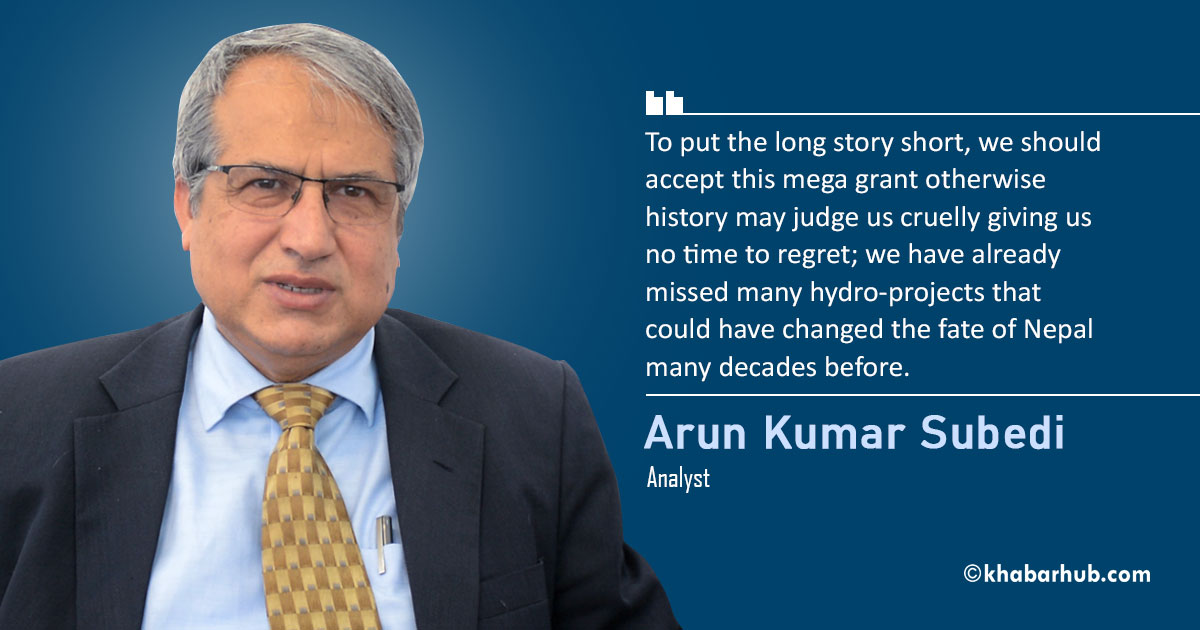0%

At a time when a section of the society, especially those representing the upper spectra, are pushing their individual opinion on the widely-talked about the pros and cons of the Millennium Challenge Corporation (MCC) in Nepal, it would not be irrelevant to drop few words on it.
Is MCC in Nepali interest?
As almost all the documents that have to come at the public mentioned, the MCC grant came at the request and long lobbying for it from the Nepali side. As an individual with a specific interest in the hydropower sector, I have been observing the various potentials in the energy sector. It is pleasant to say that Nepal is capable of generating 42,000 MW energy, but where are the financial resources?
Living in a gold bed does not feed the hungry belly, wise is the one who can utilize the resources one has got in a sustainable way. In the case of Nepal, we have both white gold and green gold as referred to the hydro energy and bio-diversity. But are we able to utilize them properly, if we look at it more seriously, we realize at once that we are incapable of utilizing the resources?
MCC as a 500 million US dollar project with focused investment in transmission line extension and road network expansion is undoubtedly a national pride project. At a time when we cannot make a massive investment in infrastructure building, if some friends wish to help us by directly investing in infrastructure, we have to welcome it. In fact, as I know it, it’s not a loan to form a ‘debt-trap’; it’s a grant, so it is unwise and irrational to slip off the offer made to Nepal.
Should Nepal refrain the project if it is related to Indo-Pacific Strategy?
It is funny that some so-called scholars are committed to executing their ritual of cursing everything that comes from the US government as something against a particular ideology or country. It’s foolish to go after such remarks. One has to judge things on the more rational ground.
Firstly, if we look at the origin of MCC we find it coming into existence long before Indo-Pacific Strategy put forward these days.
Obviously, each country has its own criteria for donation. Who donates to the enemies or rivals who are likely to fight against himself? As a superpower advocating for democracy, equity, justice, an open and free society and right to the pursuit of happiness, the USA also has set some criteria for its grants.
If we look at the MCC Compact Nepal, we find the criteria reiterated as well. However, the US government has not set any mandatory criteria that can be against Nepal or Nepali interest. Indo-Pacific Strategy is also forwarded by the US government, so they may serve similar interests to some extent.
But the strategy, as the documents made public so far, say and the US government has been saying that there is no hidden intent in providing MCC grant, we have to believe it.
We also have to believe in the formal proclamation made by the US and Nepal government as the signing party and we have to believe in the documents produced by both sides. It’s unwise to make remarks swayed by emotions and just being ‘provoked’ by someone.
To put the long story short, we should accept this mega grant otherwise history may judge us cruelly giving us no time to regret; we have already missed many hydro-projects that could have changed the fate of Nepal many decades before.
(Based on an interview with Arun Kumar Subedi, a foreign affairs expert)
Nepal has been enjoying age-old friendship with the US, it’s like a token of friendship that has come in the 70th anniversary, so we should go for it.
Nepal and the US have been enjoying a very harmonious bilateral relationship in the past. Lately, US formal assistance seemed to have been confined to the aid coming either via INGOs or to the military. In this context, Nepal has requested a massive loan and the USA has agreed to provide it.
So, to protest against the loan applied by oneself is irrational. Besides, we have accepted the agreement which openly seems to promote not only an ideology but arouse suspicions of one of the neighbors.